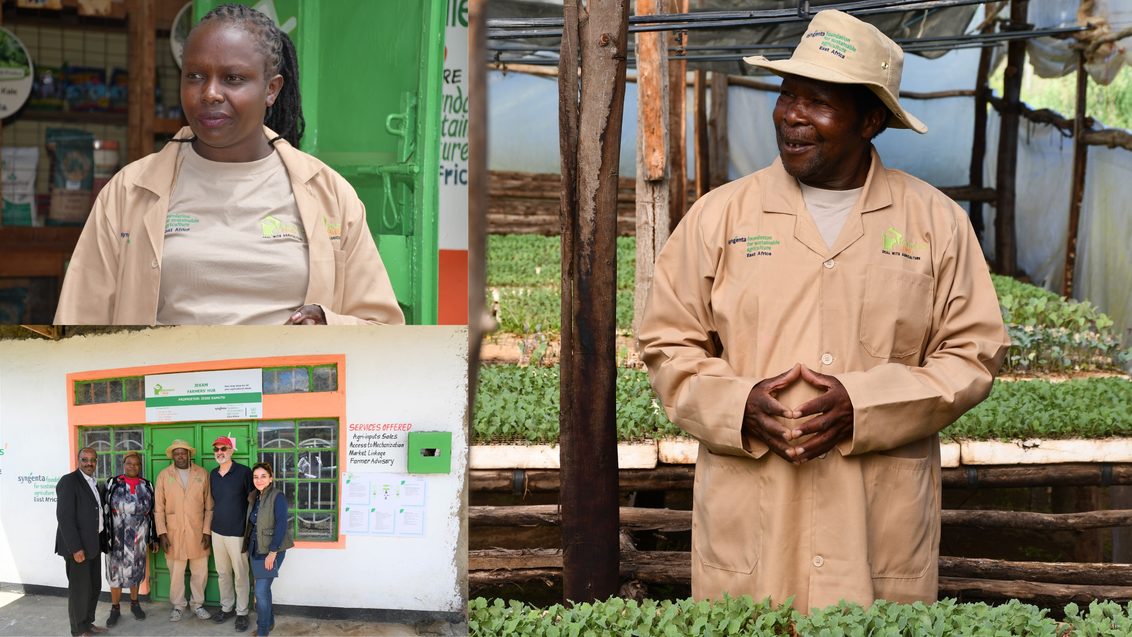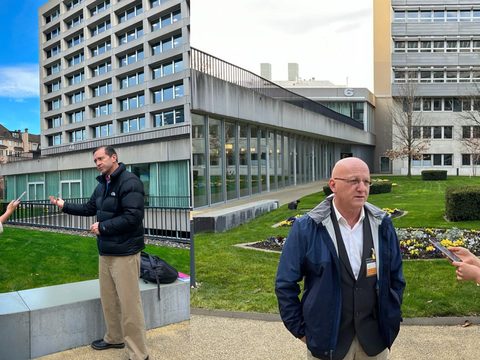Stories of Empowerment, Scaling, and Inspiration

We are looking to ‘graduate’ all 3 of these enterprises during 2024
By Simon Winter
One of the aspects of my work that brings me joy and revitalises my sense of purpose is getting out to meet with the agri-entrepreneurs and smallholder producers we support through our work. Last week, it was a privilege to visit three such entrepreneurs and several farmers in Nyandarua County, Kenya, and to learn about their successes and challenges. I loved learning about their stories and hearing firsthand about the challenges they are facing. This inspires me and our colleagues to adapt our approaches and strive to do better.
A Story of Empowerment
Priscilla Wambui runs Precious Weru Farmers Hub in Kirima Ngai Location, Ol Jorok Sub-County in Nyandarua County. In 2018, Priscilla took her business administration training to launch a small farm supply shop. 3 years later, our Seeds2B team engaged with her to set up a potato seed nursery at her 3-acre farm not too far from the shop. Now, she is supplying 350 local farmers with clean, certified potato seeds and a range of other products they need to support their farming activities – saving them considerable time and expense as the nearest alternative outlets for such products are about 5 km away at a market called Kasuku. She trains her farmer customers on climate-smart agricultural methods, helping them adapt to the changing weather and environment. She also works with an independent, trained, and suitably equipped entrepreneurial spraying service provider, to ensure that the farmers can protect their crops safely for them and their families. And she is making enough profits to have leased an additional 9 acres to expand her farming activities. Her ambition is now to get into logistics so she can support an expanded number of farmers across her community. Women’s economic empowerment in action.
A Story of Scaling
Jessee Kamutu runs JEKAM Enterprises. Jessee, previously a smallholder farmer, started a potato multiplication Farmers’ Hub with his wife Mary Mwihaki about 5 years ago. With support from CIP (the International Potato Centre) and the Syngenta Foundation’s Agriservices and Seeds2B PASTTA programs, he has a clean production facility for potato mini tubers grown from apical cuttings. Now he and his 10 employees help farmers across the region with access to soil testing, mechanisation services, market access for their produce, and quality inputs. Supported farmers are more than doubling yields and incomes. He has moved from being a farmer to a business manager, leading a network of other 30 Farmer Hubs, supporting close to 10,000 smallholders with such integrated services. With Jessee's and Mary’s diligence, they have achieved inspirational success and have built a small training hall in which they train the Farmer Hub managers and farmers. With the reach, he has attracted the attention from universities, research organizations, market players, and banks, eager to support his further growth and farmer engagement. He and several colleagues have formed a cooperative to further spread the benefits of their experience. Scaling in action. Still, he and his community have unmet needs including improved mechanisation access and affordability, better water catchment systems, improved medium-range weather forecasts, and increased availability of non-mineral or chemical fertilizers.
A Story of Inspiration
Johnson and Nancy Kimani run KIMNA Farmers Hub in Githioro, Njabini . They were inspired by James and Mary to launch a vegetable seedling nursery only a year ago. Already they have over 500 farmers they are supporting with high quality seedlings, market linkages, soil testing (supported by OCP-Africa), training and advisory services. As a senior in his community, he was worried that high-quality without thinking about the sustainability of his enterprise. Fortunately, his daughter, Esther Njeri Kimani decided to come back from running a small retail and Mpesa (Kenya’s leading mobile money service) kiosk to support and eventually take over the enterprise from her parents. Unmet needs include a reliable and affordable supply of affordable treated growing media and reliable market access for their farmers’ produce. One option they are exploring to add to the nursery is farm management for absentee ‘telephone farmers,’ which could add productivity and resilience to those farms (versus being operated purely by casual labour) and an additional income source for their Hub.
Our Foundation is looking to ‘graduate’ all 3 of these enterprises from our handholding during 2024, along with about 180 others. In doing so, we will look to ensure they have all the skills, and business and technical connections they need to continue to grow and thrive. Sustainability in action.

